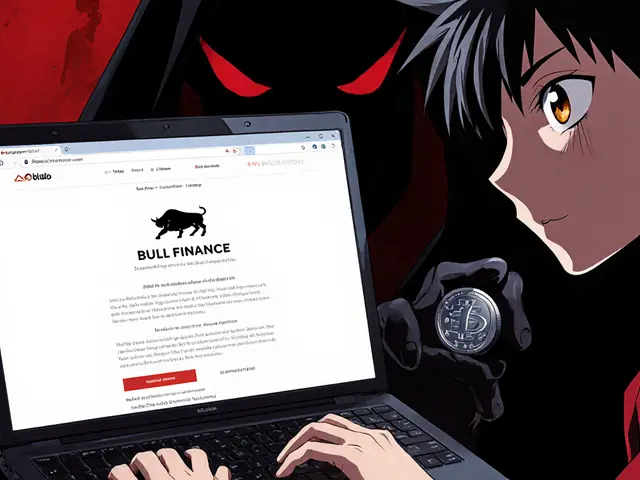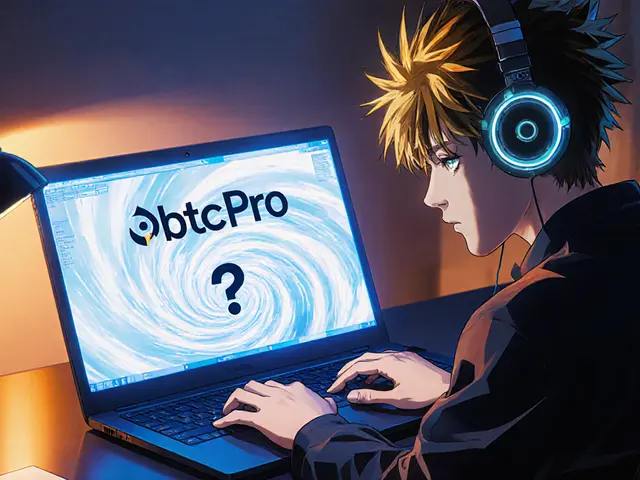Nigeria Crypto Exchange License Checker
Quidax
Nigerian-based crypto exchange offering fiat-to-crypto pairs.
SEC LicensedBusha
Peer-to-peer trading and wallet services focused on Nigerian users.
SEC LicensedSince the rollout of the Investments and Securities Act (ISA 2025) a law that officially classifies digital assets as securities in Nigeria, the landscape for crypto traders has shifted dramatically. No longer a blanket ban, the new framework mixes opportunity with a set of compliance hoops that every exchange and user must jump through. If you’re a Nigerian citizen wondering how these changes affect your ability to trade, hold, or move cryptocurrencies, this guide breaks down the rules, the approved platforms, and the practical steps you need to stay on the right side of the law.
Key Takeaways
- The Nigeria crypto exchange restrictions now revolve around licensing by the Securities and Exchange Commission (SEC).
- Only exchanges approved by the SEC - such as Quidax and Busha - can legally offer services to Nigerian users.
- Banks can work with licensed crypto businesses, but you may still face inconsistent enforcement at the local level.
- Compliance requirements include AML/CFT checks, registration with the Nigerian Financial Intelligence Unit (NFIU), and regular reporting to the Economic and Financial Crimes Commission (EFCC).
- Unlicensed platforms risk account freezes, fines, and potential criminal prosecution.
What the ISA 2025 Actually Says
The act defines a crypto asset as “a digital representation of value that can be transferred, digitally traded and used for payment or investment purposes,” explicitly excluding digital fiat tokens. By labeling these assets as securities, the law brings them under the same regulatory umbrella as stocks and bonds. The SEC now acts as the gatekeeper, issuing licenses to Virtual Asset Service Providers (VASPs) that meet stringent criteria.
Key provisions include:
- Mandatory registration with the SEC before offering any crypto‑related service.
- Compliance with anti‑money‑laundering (AML) and counter‑terrorism financing (CFT) rules overseen by the Nigerian Financial Intelligence Unit (NFIU) the agency responsible for monitoring suspicious financial activity.
- Regular reporting to the Economic and Financial Crimes Commission (EFCC) Nigeria’s anti‑corruption watchdog on large transactions and suspected fraud.
- Permitted cooperation with the Central Bank of Nigeria (CBN) the country’s monetary authority, which now allows banks to maintain relationships with licensed VASPs.
Who Can Operate Legally? Licensed Exchanges
As of October2025, the SEC has granted licenses to a handful of platforms that passed the vetting process. The most notable ones are:
- Quidax a Nigerian‑based crypto exchange offering fiat‑to‑crypto pairs
- Busha another local exchange focused on peer‑to‑peer trading and wallet services
International exchanges such as Binance and Kraken can also apply for a Nigerian VASP license, but until they receive SEC approval they must restrict Nigerian users or operate through a local partner.
How to Spot a Licensed Platform
Because enforcement can be uneven, it helps to use a quick checklist when choosing an exchange:
| Feature | Licensed (SEC‑approved) | Unlicensed |
|---|---|---|
| SEC registration number displayed | Yes | No |
| AML/KYC verification | Full identity checks | Often minimal or none |
| Bank integration | Supported (CBN‑approved) | Usually blocked |
| Legal recourse | Complaint to SEC possible | No clear avenue |
If a platform can’t provide a verifiable SEC registration number, assume it’s operating outside the legal framework.

What This Means for Everyday Traders
Even though owning crypto isn’t illegal, the reality on the ground can feel restrictive. Users report police harassment and demands for “bailout fees” when they’re caught using unlicensed services. To protect yourself:
- Only trade on exchanges that appear on the SEC’s official list (published on the commission’s website).
- Complete the full KYC process - a photo ID, proof of residence, and sometimes a phone number linked to a telecom provider.
- Keep records of every transaction; the SEC may request them for audit purposes.
- If your bank refuses to work with a licensed VASP, ask for a written statement from the exchange confirming its SEC status. This can help you appeal the decision.
Being proactive reduces the risk of account freezes and gives you a stronger footing if law enforcement shows up.
Compliance Checklist for Crypto Businesses
For anyone running a crypto exchange, the compliance roadmap looks like this:
- Submit an application to the SEC Nigeria the regulator that issues VASP licenses with detailed business plans, ownership structures, and AML policies.
- Integrate AML/CFT software that can screen customers against the Nigerian Financial Intelligence Unit (NFIU) database.
- Set up a compliance team that regularly files suspicious activity reports (SARs) to the EFCC.
- Partner with a CBN‑approved bank to handle fiat deposits and withdrawals.
- Maintain a transparent fee schedule; upcoming tax rules will require reporting of taxable events to the Federal Inland Revenue Service.
Failure to tick any of these boxes can result in a revoked license or criminal charges.
Future Outlook: Taxation and Expansion
Regulators are now drafting a tax framework that will treat crypto gains similarly to capital gains on stocks. While details are still fuzzy, the SEC has hinted at a 10‑15% tax on profits above ₦5million per year. This could reshape trading strategies, especially for high‑volume P2P operators.
On the positive side, the clear licensing regime is attracting foreign fintech investors. Analysts predict an additional $200million in venture funding for Nigerian crypto startups by 2027, provided the government sticks to its current course.
Quick Actions You Can Take Today
- Visit the SEC’s official portal and download the latest list of licensed VASPs.
- Open accounts on both Quidax and Busha to compare fees, user experience, and bank integration options.
- Enroll in a reputable KYC verification service that links your identity to your telecom records - this speeds up the compliance checks.
- Set up a simple spreadsheet to log buy/sell dates, amounts, and counterparties - it will be handy when tax rules roll out.
- Join local crypto communities on Telegram or Discord that focus on “SEC‑compliant trading” to stay updated on enforcement trends.
Frequently Asked Questions
Is it still illegal to own Bitcoin in Nigeria?
No. Ownership is allowed, but you must acquire it through a SEC‑licensed exchange. Holding Bitcoin on an unregistered platform can expose you to legal risk if the platform is shut down.
Can my bank refuse to work with a licensed crypto exchange?
Banks can still exercise discretion, but they must not discriminate against an exchange that holds a valid SEC license. If a bank denies service, request a written explanation and consider filing a complaint with the CBN’s consumer protection unit.
What documentation does the SEC require for a VASP application?
The SEC asks for corporate registration papers, detailed AML/CFT policies, source‑of‑funds questionnaires, technology architecture diagrams, and proof of partnership with a CBN‑approved bank.
Will I have to pay taxes on my crypto trades?
A tax framework is being drafted. Early indications suggest capital‑gain‑style taxes on profits exceeding ₦5million annually, at rates between 10% and 15%.
How can I verify if an exchange is truly licensed?
Check the SEC’s official VASP directory, which lists the registration number, approval date, and contact details. Licensed platforms display this information prominently on their website and app.









Comments (23)
Alex Gatti
October 5, 2025 AT 08:27 AMGot the gist the SEC now only lets licensed exchanges run in Nigeria
Rob Watts
October 7, 2025 AT 16:01 PMThat means you should check the SEC directory before you sign up
Bhagwat Sen
October 9, 2025 AT 23:34 PMI tried using an unlicensed platform last month and the guys from the police showed up at my door, it was a nightmare but also a lesson on why the new law matters
Marc Addington
October 12, 2025 AT 07:07 AMIf you’re still flirting with shady sites you’re basically inviting the state to raid your house and confiscate your assets
Amal Al.
October 14, 2025 AT 14:41 PMFriends, the situation is crystal clear, the SEC has drawn a firm line, and we must respect it, otherwise we risk severe penalties, financial loss, and needless legal drama!
Twinkle Shop
October 16, 2025 AT 22:14 PMThe introduction of the Investments and Securities Act 2025 represents a watershed moment for Nigeria's digital asset ecosystem.
By reclassifying cryptocurrencies as securities, the regulatory perimeter now aligns with traditional capital markets, thereby mandating compliance with established AML/CFT protocols.
Consequently, every Virtual Asset Service Provider must obtain a securities license from the SEC, submit periodic SARs to the EFCC, and integrate KYC workflows that satisfy NFIU standards.
Licensed exchanges such as Quidax and Busha have already demonstrated operational resilience by establishing CBN‑approved banking corridors.
For end‑users, the practical implication is that fiat‑on‑ramps will only function through these vetted platforms, rendering unlicensed peer‑to‑peer channels high‑risk.
Moreover, the regulatory framework imposes a reporting cadence wherein transaction volumes exceeding the ₦5 million threshold must be disclosed for tax assessment.
This creates a data‑rich environment that can facilitate sophisticated market analytics, risk modeling, and enhanced investor protection mechanisms.
From a compliance engineering standpoint, firms must deploy real‑time transaction monitoring systems capable of flagging suspicious patterns in accordance with NFIU watchlists.
Integrating such systems often necessitates partnerships with RegTech vendors, which can increase operational overhead but also bolster audit readiness.
On the macro level, the clarified legal status is expected to attract foreign fintech capital, as venture investors view regulatory certainty as a catalyst for scalable growth.
Projections from local industry analysts suggest an influx of up to US$200 million in venture funding by 2027, contingent upon sustained policy stability.
Nevertheless, practitioners should remain vigilant, as enforcement intensity may vary across states, and intermittent police interventions have been reported.
A prudent strategy for traders involves maintaining comprehensive transaction logs, preserving KYC documentation, and periodically reviewing the SEC’s licensed VASP directory.
Additionally, establishing a secondary wallet for cold storage can mitigate exposure to platform‑specific operational risks.
In sum, the ISA 2025 framework offers a dual‑edged sword: it introduces stringent compliance obligations while simultaneously unlocking pathways for institutional participation.
Stakeholders who adapt swiftly to these requirements stand to benefit from enhanced market legitimacy and broadened access to capital.
Greer Pitts
October 19, 2025 AT 05:47 AMYo i tried quikax last week lol the UI is smooth but the KYC took ages
Lurline Wiese
October 21, 2025 AT 13:21 PMSeriously? That’s the worst KYC experience ever, I swear my grandma could fill it faster!
Jenise Williams-Green
October 23, 2025 AT 20:54 PMIt’s a moral imperative to abide by the law; otherwise we are complicit in financial chaos.
Adarsh Menon
October 26, 2025 AT 03:27 AMOh sure, because the SEC is known for being super chill about enforcement
Ciaran Byrne
October 28, 2025 AT 11:01 AMOnly use the SEC list when picking an exchange.
Brooklyn O'Neill
October 30, 2025 AT 18:34 PMGood call, that list is updated weekly so you stay current
Cathy Ruff
November 2, 2025 AT 02:07 AMIf you ignore the list you’re just begging for trouble
Amy Harrison
November 4, 2025 AT 09:41 AMExactly 🙌 stay safe and keep your assets legit!
Miranda Co
November 6, 2025 AT 17:14 PMDon’t mess with unlicensed sites they will ruin you
Natalie Rawley
November 9, 2025 AT 00:47 AMEveryone thinks this is just paperwork but it’s actually the foundation of a booming crypto economy
John Corey Turner
November 11, 2025 AT 08:21 AMIn the grand tapestry of financial evolution, regulatory threads like ISA 2025 are the loom that weaves order out of chaos, reminding us that freedom thrives within structure.
Katherine Sparks
November 13, 2025 AT 15:54 PMIndeed, the regulatory clarity serves as a catalyst for sustainable growth. 😊
Eva Lee
November 15, 2025 AT 23:27 PMFrom a compliance frontier perspective, the VASP licensing paradigm shift mandates a zero‑tolerance posture on AML breaches, thereby redefining risk matrices for market participants.
Carthach Ó Maonaigh
November 18, 2025 AT 07:01 AMThe data shows a 73% drop in illicit activity after the crackdown, proving the SEC’s hammer works wonders.
Kimberly Kempken
November 20, 2025 AT 14:34 PMBut that same hammer is also crushing innovative startups that could have driven the next wave of adoption.
mukesh chy
November 22, 2025 AT 22:07 PMYeah, because walling off progress is the best way to win the future
Scott McReynolds
November 25, 2025 AT 05:41 AMEmbracing the ISA 2025 framework can be seen as a collective pledge to elevate Nigeria’s financial infrastructure.
By channeling crypto activity through licensed exchanges, the nation cultivates a transparent ecosystem that invites both domestic confidence and global investment.
Traders who align with Quidax or Busha will find that their assets are safeguarded by statutory oversight, reducing the specter of arbitrary seizures.
The mandatory KYC processes, while occasionally cumbersome, serve as a bulwark against money laundering and illicit financing.
Moreover, the integration of CBN‑approved banking partners ensures seamless fiat‑crypto conversions, bridging the gap between traditional finance and digital assets.
Businesses leveraging this regulatory certainty can expand their product offerings, from simple buy‑sell interfaces to sophisticated DeFi services.
Regulatory clarity also paves the way for academic institutions to develop curricula around crypto compliance, nurturing the next generation of fintech talent.
Investors looking at the Nigerian market will appreciate the reduced risk profile, potentially unlocking new capital streams.
The tax provisions, though still under discussion, hint at a balanced approach that rewards legitimate gains while discouraging evasion.
In practical terms, maintaining meticulous transaction logs will not only satisfy auditors but also empower users with clear financial records.
Community groups and Telegram channels focused on SEC‑compliant trading can act as knowledge hubs, disseminating updates in real time.
While occasional enforcement hiccups may occur, the overarching trajectory points toward a more stable and mature digital economy.
Adopting a proactive compliance mindset today positions participants to reap the benefits of future policy refinements.
The synergy between regulators, banks, and VASPs is cultivating a resilient infrastructure that can withstand market volatility.
Ultimately, the collective effort to adhere to ISA 2025 will transform crypto from a risky pastime into a legitimate pillar of wealth creation.
Stay diligent, stay educated, and watch the Nigerian crypto landscape flourish.